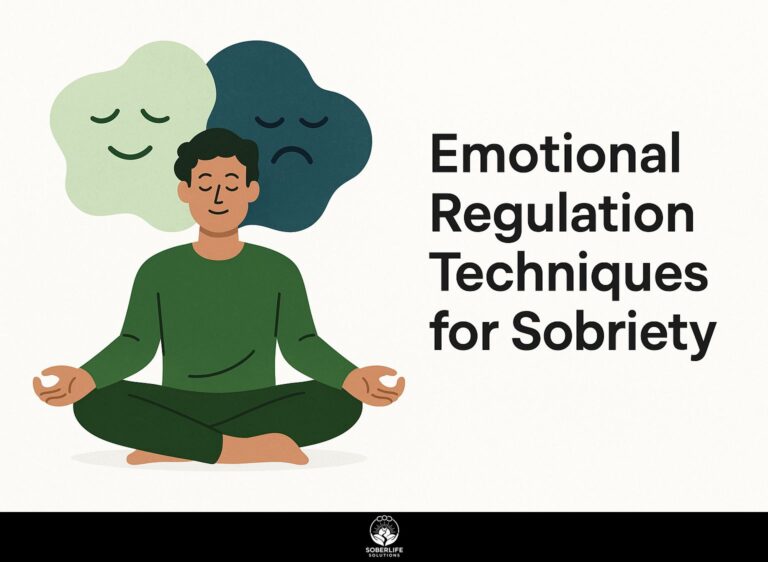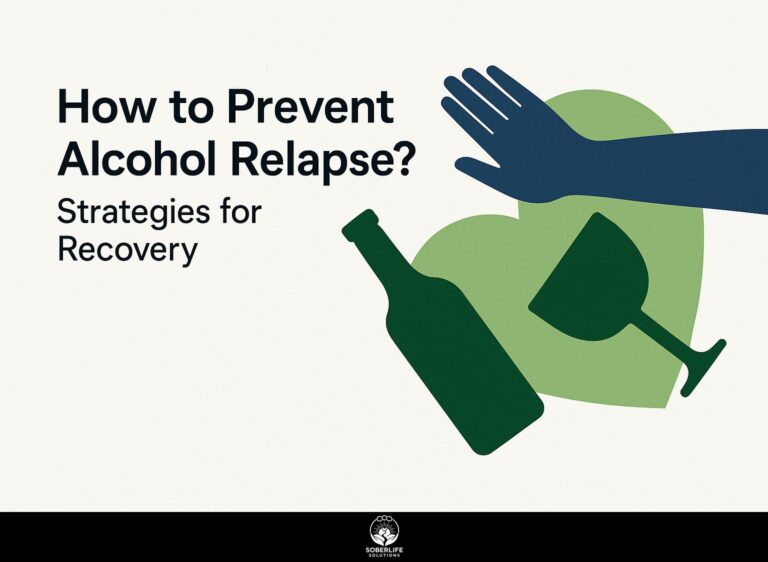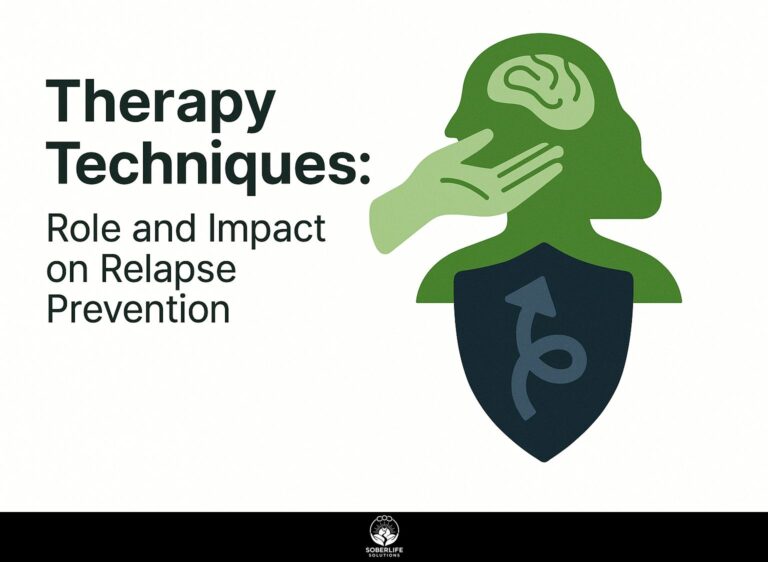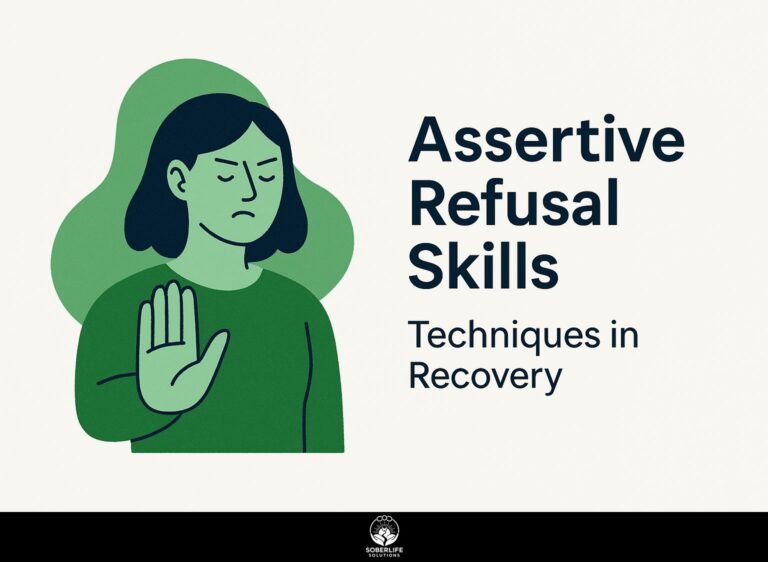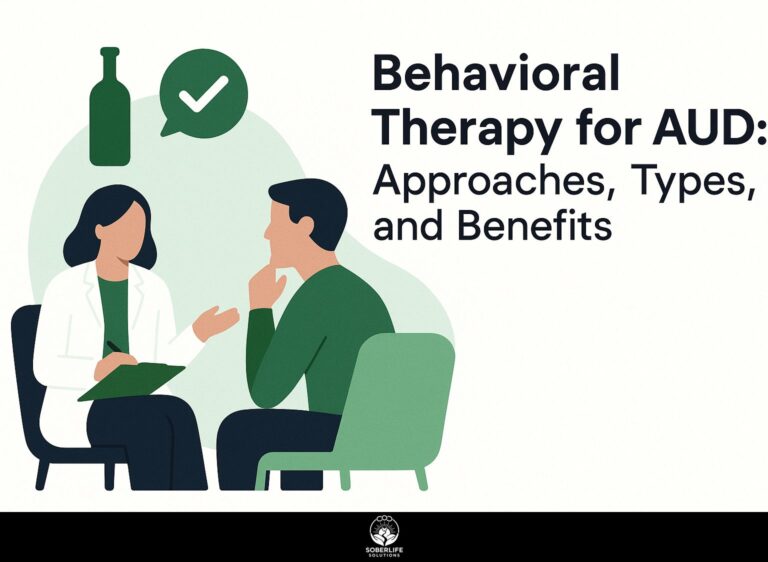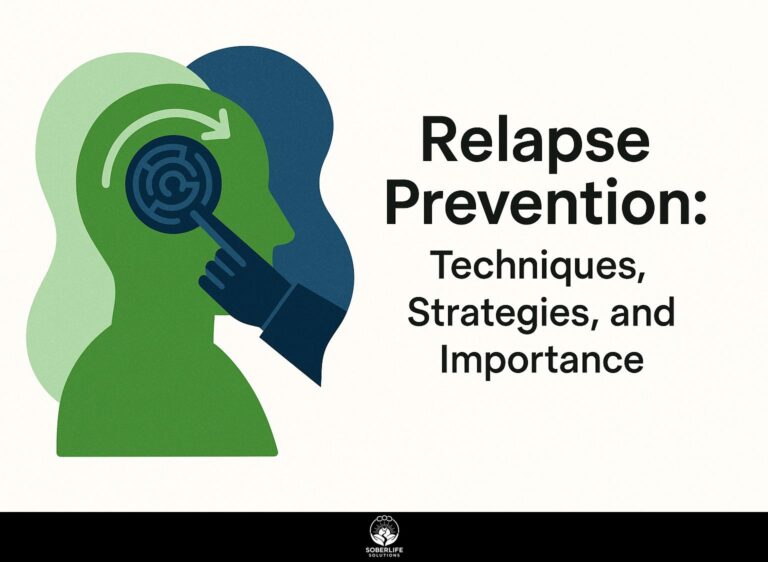Spiritual Practices: Role in Relapse Prevention
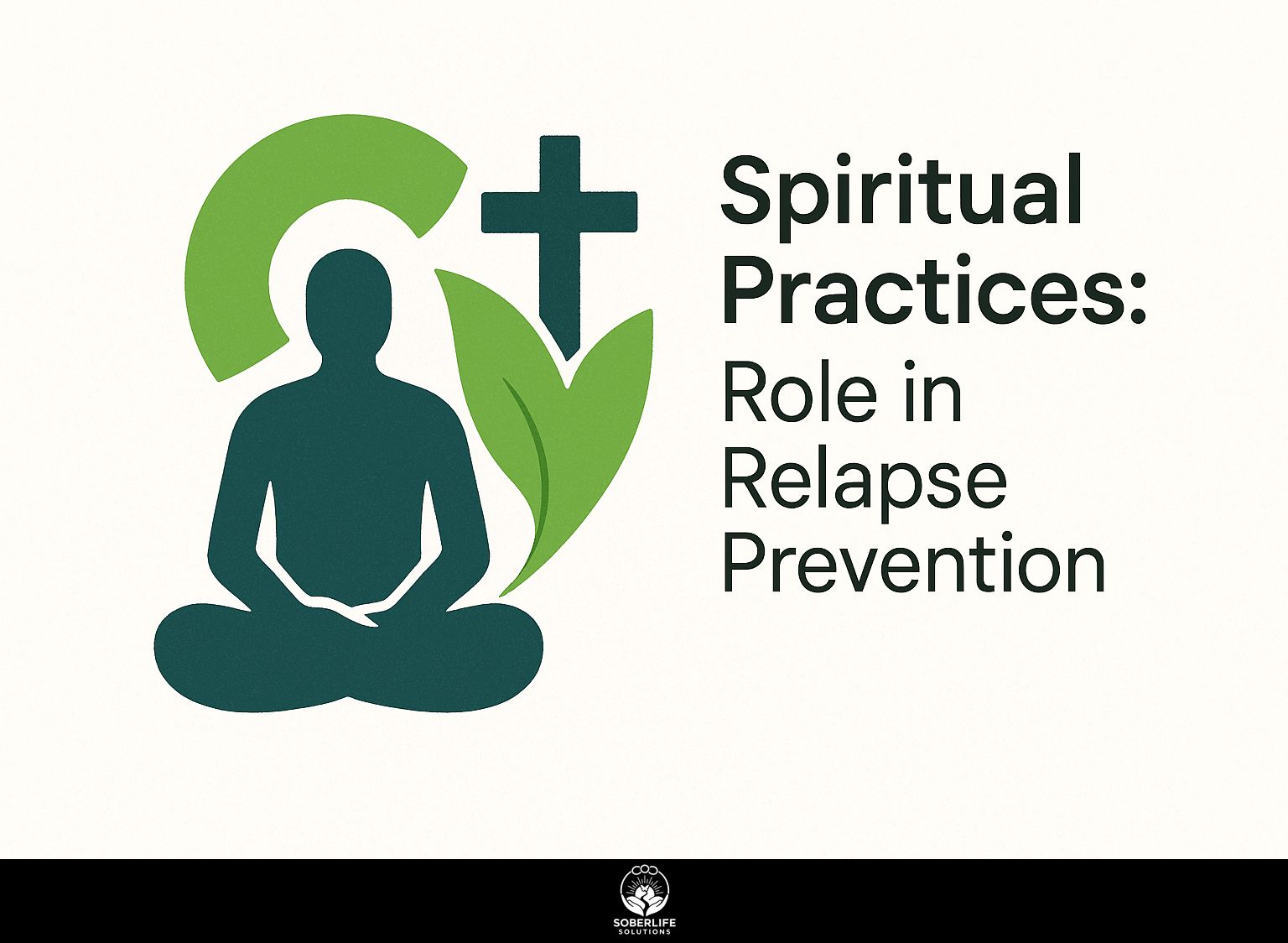
Spirituality is important in addiction treatment, as it provides methods to prevent relapse and improve recovery programs. Organizations such as Alcoholics Anonymous and Narcotics Anonymous use spiritual practices to help people recover. The Association for Addiction Professionals also points out their importance. This article looks at how spiritual activities help build emotional strength, support social connections, and develop ways to handle challenges. It offers helpful information for people dedicated to staying sober and improving their recovery.
Key Takeaways:
Definition and Importance
Spirituality is about a personal search for meaning in life. It often includes activities that help connect people to a higher power or provide community support.
For people dealing with substance use problems, spirituality can offer important ways to cope.
Practices such as meditation or prayer encourage mindfulness, aiding people in handling cravings and stress. Support groups often involve spiritual elements, encouraging a sense of togetherness and shared objectives.
For example, 12-step programs like Alcoholics Anonymous emphasize personal spirituality as an essential component for recovery. By building self-worth and a sense of community, these practices can strengthen resilience and offer a solid foundation for dealing with challenges.
Link to Relapse Prevention
Integrating spiritual practices such as mindfulness and community support significantly reduces relapse rates by up to 50% according to recent studies.
Mindfulness techniques, like meditation, help individuals focus on the present and manage cravings effectively, often leading to improved emotional regulation.
Groups like AA and spiritual retreats help people connect and stay committed to sobriety.
A study published in the Journal of Substance Abuse Treatment found that participants who engaged in spiritual practices experienced a 60% increase in long-term recovery success.
By including regular meditation sessions and going to support meetings, people can improve their coping skills and feel a sense of purpose and connection, which are important for maintaining sobriety, as highlighted by a RAND Corporation report on mindfulness-based relapse prevention.
Types of Spiritual Practices
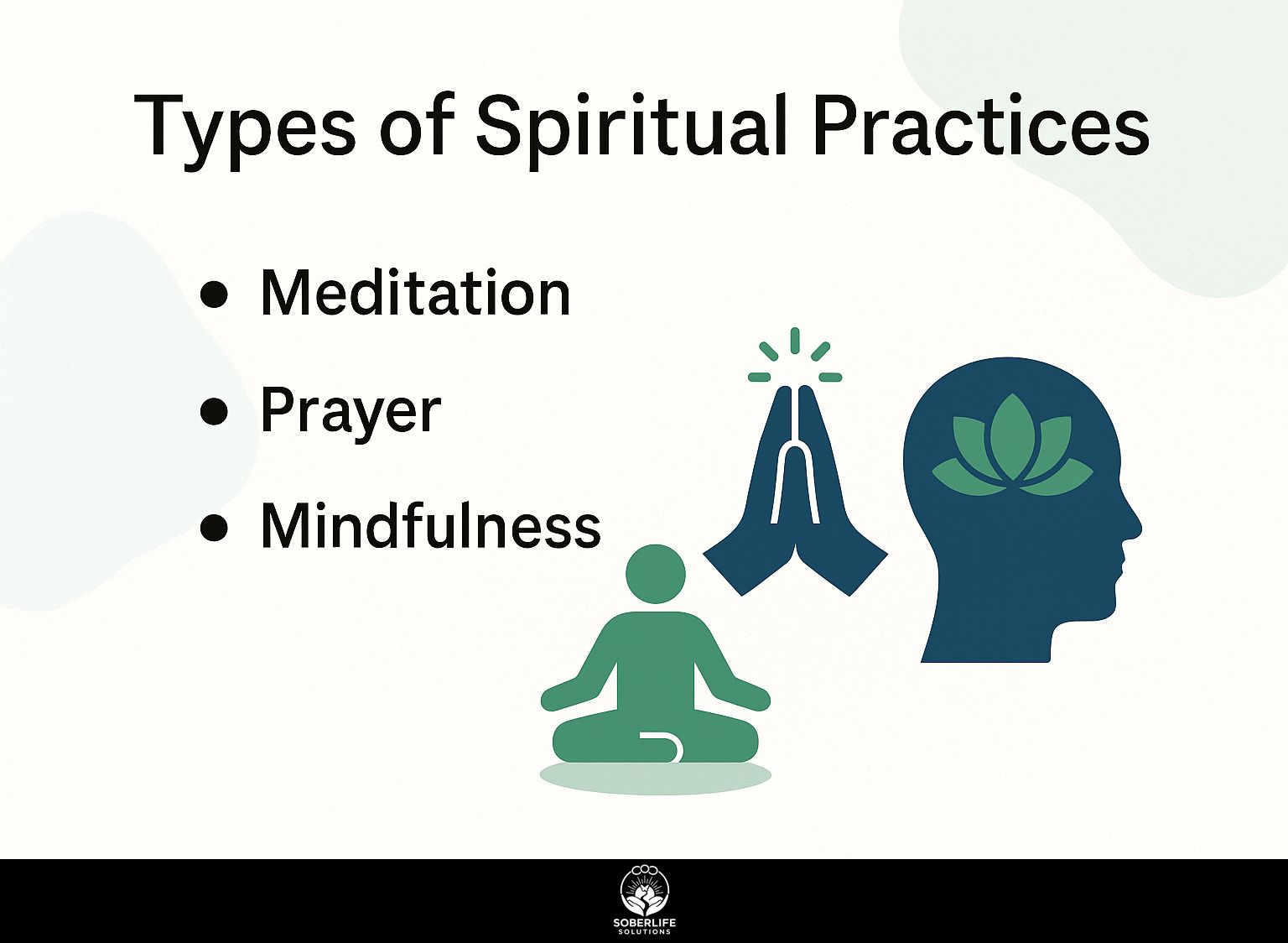
Different spiritual activities can be used in recovery, each providing special benefits that suit personal needs and choices. This approach aligns with the principles outlined in our discussion on Spiritual Health: Purpose and Meaning in Recovery, providing further insights into how these activities contribute to personal well-being.
Meditation
Meditation, particularly mindfulness meditation, has been shown to improve emotional regulation and reduce substance use frequency among individuals in recovery.
To begin meditating, think about trying guided meditation apps such as Headspace or Calm, which have sessions made for those new to meditation.
Try meditating for 10-20 minutes each day, and slowly spend more time as you get used to it. Pay attention to your breathing and notice your thoughts without criticism. This helps build emotional awareness and strength.
Performing an activity at the same time each day helps you maintain the habit and include it in your daily schedule. Over time, users often report reduced anxiety and improved focus, essential benefits for those in recovery.
Prayer
Prayer is a strong way to build a spiritual bond, often resulting in improved emotional balance and strength.
Including different forms of prayer in daily routines can significantly build personal faith and community bonds.
Quiet prayer encourages thinking about oneself and promotes calmness. Spoken prayer shares intentions aloud, creating a sense of accountability and connection. Group prayer builds community, offering mutual support and collective strength.
To weave prayer into your routine, consider:
- Setting aside five minutes each morning for silent reflection,
- Joining friends weekly for group prayer, or
- Maintaining a journal for written prayers.
These practices can support your spiritual growth and improve your well-being.
Mindfulness
Mindfulness, as a spiritual practice, helps people focus on the present, which has been connected to better ways of dealing with challenges for those in recovery.
One effective technique is the 5-4-3-2-1 grounding exercise, which helps redirect focus during moments of anxiety. To practice, identify:
- five things you can see,
- four you can touch,
- three you can hear,
- two you can smell, and
- one positive thing about yourself.
Adding this to your daily routine, like before a tough meeting or when you’re feeling tempted, helps you become more aware of yourself. Try apps like Headspace or Calm for guided meditations to help improve your mindfulness routine and aid in your continued recovery.
Benefits of Spiritual Practices in Recovery
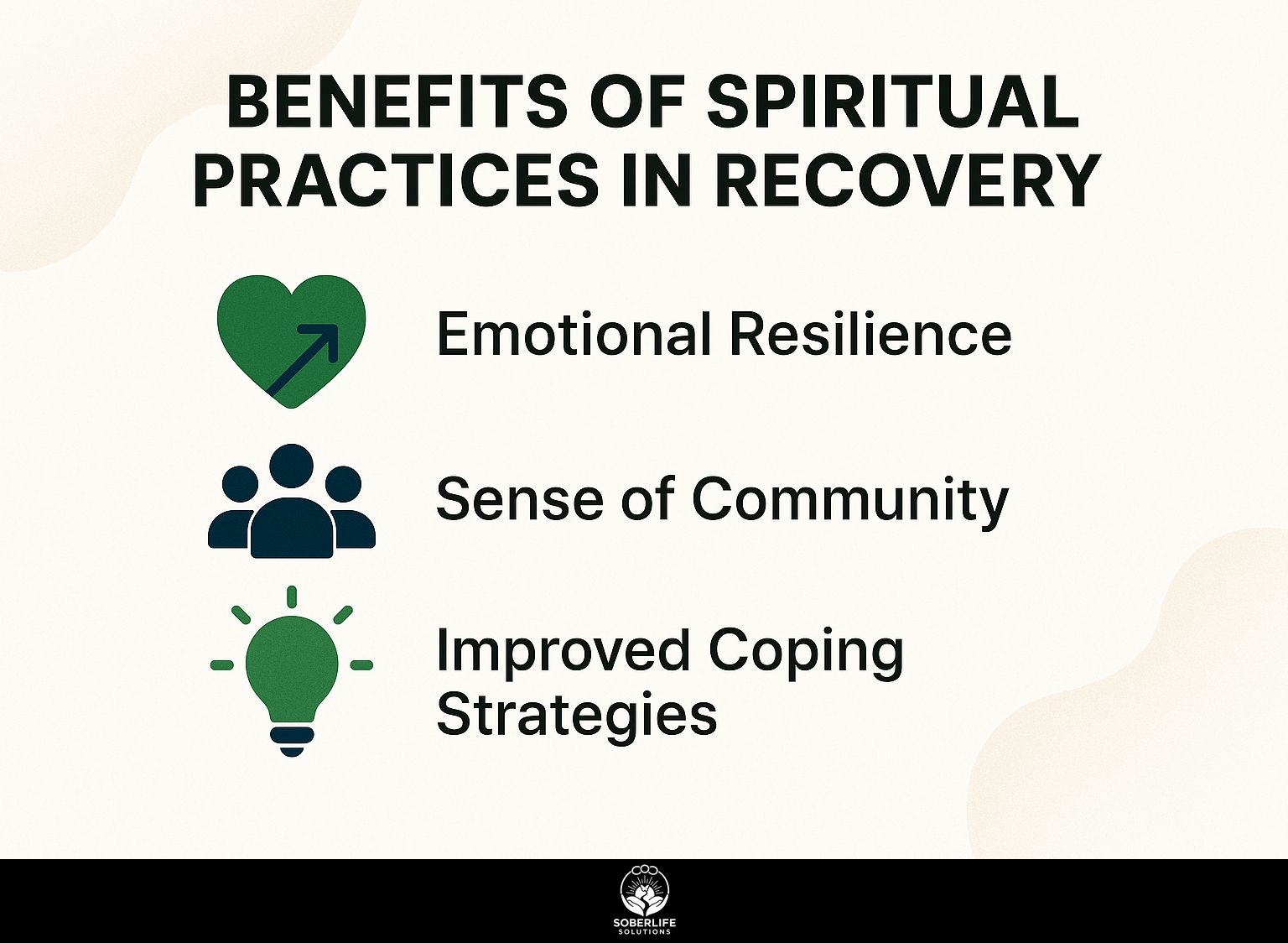
Participating in spiritual practices can greatly help people in recovery by improving their emotional strength and strengthening their ties to helpful groups. For those seeking deeper insights, exploring the journey of spiritual fulfillment in alcoholism recovery can provide valuable guidance on this path.
Emotional Resilience
Spiritual activities strengthen emotional strength, helping people cope more effectively with stress and triggers related to substance use disorders.
Studies show that mindfulness meditation, prayer, and yoga significantly improve coping skills.
For instance, a study published in the Journal of Substance Use found that participants engaging in weekly mindfulness sessions reported a 30% decrease in cravings and anxiety levels. Individuals practicing yoga noted improved mood and emotional stability.
Testimonials from practitioners highlight these benefits:
- A person recovering from addiction mentioned that meditating regularly helped her identify and handle what sets off her cravings, leading to a better way of dealing with stress.
According to a recent publication on ResearchGate, adding these habits to your daily schedule can help you handle upcoming difficulties better.
Sense of Community
Being part of a spiritual group, like Alcoholics Anonymous or Narcotics Anonymous, strengthens social support, which is important for long-term recovery.
Studies show that individuals participating in mutual help groups have a 50% higher success rate in maintaining sobriety compared to those who go it alone. The responsibility encouraged in these groups is strong; members frequently build close bonds, sharing challenges and celebrating successes together.
For example, going to meetings regularly offers emotional support and helps create a routine that strengthens personal dedication to recovery. Tools such as the 12-step program and peer support in these communities help people feel connected and encourage them in their recovery process.
Improved Coping Strategies
Spiritual activities offer people useful ways to handle stress or temptation effectively.
Techniques such as mindfulness meditation, journaling, and community support groups have shown to be particularly beneficial.
Mindfulness meditation, for instance, can reduce anxiety and improve emotional regulation.
Journaling allows for introspection and processing emotions, providing a safe space to articulate feelings. Being part of a support group can help you feel accepted and motivated by people facing similar challenges.
Using these practices often helps people develop strength and handle life’s difficulties better, supporting a complete approach to health.
Integrating Spiritual Practices into Recovery Plans
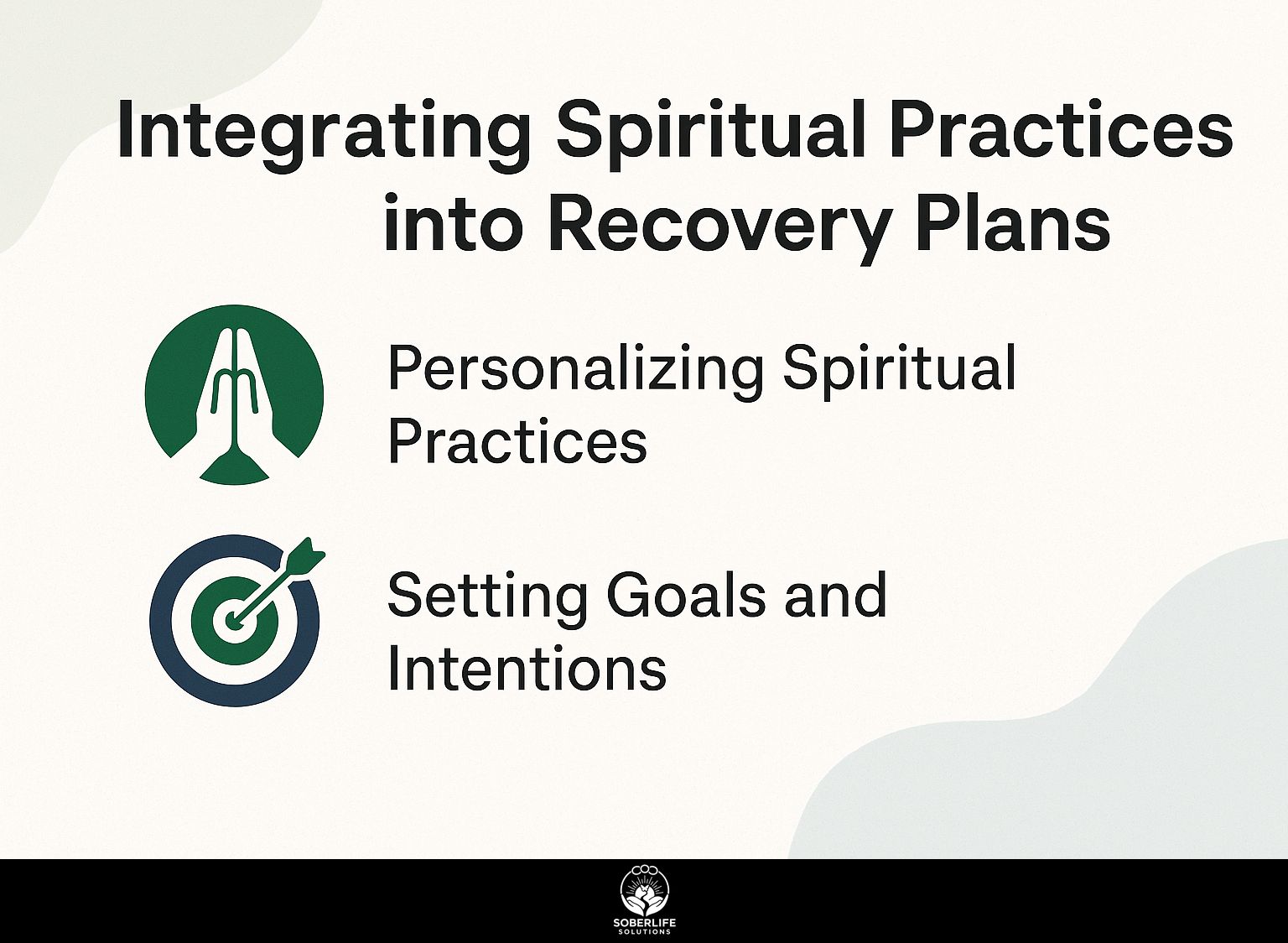
Including spiritual practices in recovery plans is important for tailoring the recovery process to fit personal beliefs and objectives.
Personalizing Spiritual Practices
Changing spiritual practices to match personal beliefs makes them more meaningful and helps with recovery.
- Start by identifying your core beliefs and values-this could be anything from nature, love, or community.
For example, a person interested in nature might include outdoor meditation or walks in the forest in their daily activities. People with traditional beliefs might change their prayer or worship routines to match their personal schedules or preferences.
Secular approaches can include mindfulness exercises or journaling for reflection. Tools like apps for meditation or gratitude journals can support these practices, ensuring they become a regular part of daily life.
Setting Goals and Intentions
Having clear goals and plans for spiritual practices can help improve dedication and attention during recovery.
To set goals effectively, use the SMART criteria: Specific, Measurable, Achievable, Relevant, and Time-bound. For example, instead of saying, “I want to meditate more,” say, “I will meditate for 10 minutes every morning for the next month.”
Creating a worksheet can help structure your intentions. Include sections for your goals, the steps needed to achieve them, and a reflection area to track your progress. This method clarifies your direction and increases motivation by setting specific goals for recognition.
Challenges and Considerations
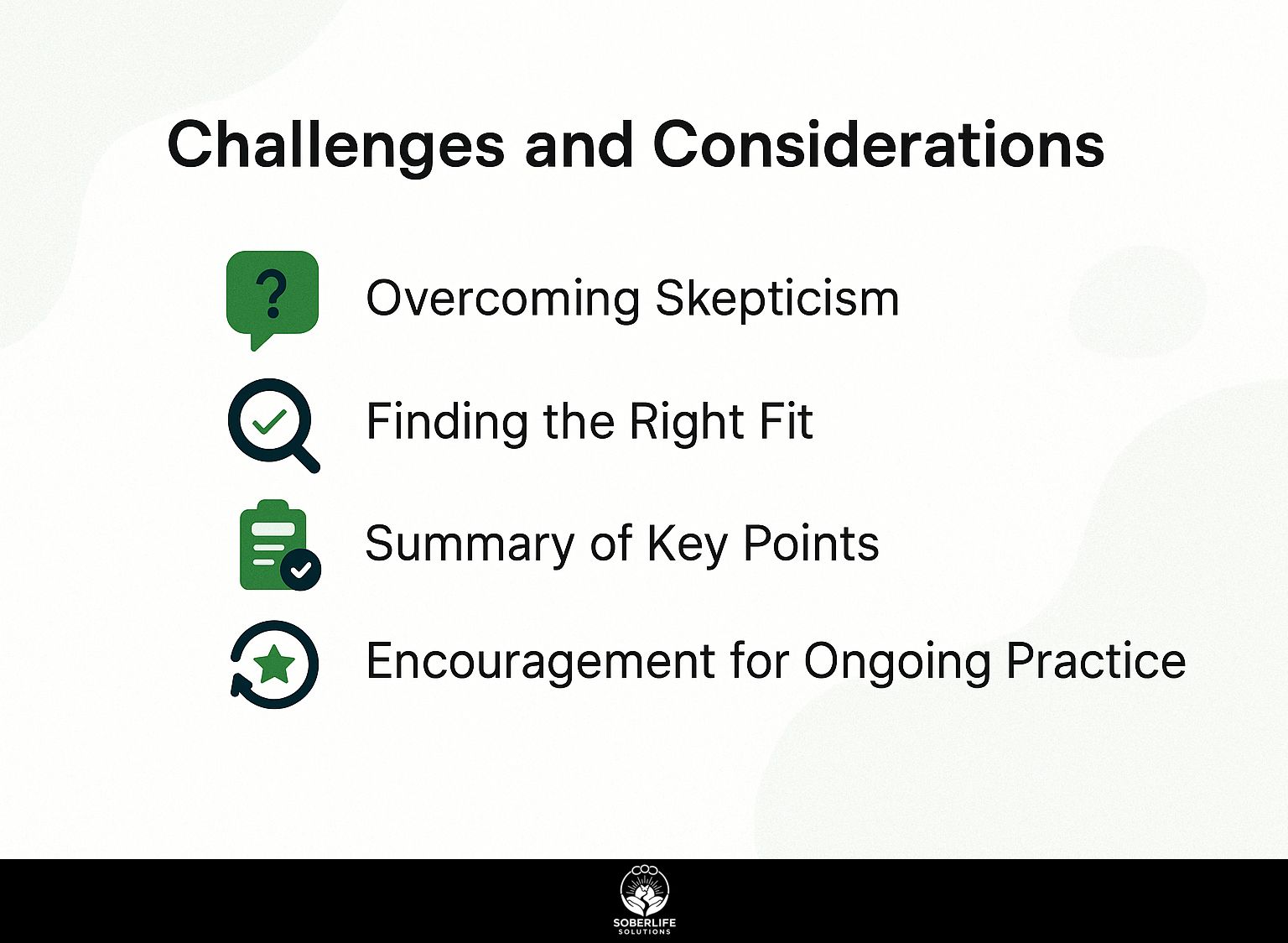
Spiritual practices provide many benefits, but people might face difficulties that need careful thought and planning to get past.
Overcoming Skepticism
Many individuals may initially approach spiritual practices with skepticism, questioning their relevance or effectiveness in the recovery process.
To overcome this skepticism, start small by integrating brief practices, such as a five-minute daily meditation or gratitude journaling.
Becoming part of local or online spiritual groups can offer a sense of community where people share their positive experiences and support each other. For example, many people in recovery programs have reported big changes after starting mindfulness meditation, mentioning they feel less anxious and more at peace.
Consider reading testimonials from those who have found strength through spirituality, as hearing personal stories can significantly bridge the gap between skepticism and belief.
Finding the Right Fit
Finding the right spiritual practice that aligns with personal beliefs and recovery goals is essential for sustaining motivation.
To learn about different spiritual practices, begin by going to workshops that teach about ideas like mindfulness, meditation, or yoga. Websites like Meetup or local community centers often host these events.
Consider joining online communities or forums like Reddit’s r/spirituality, where members share experiences and resources. You could keep a daily journal to write about your thoughts and feelings while going through this process.
This mix of in-person and online activities can help you find what interests you the most.
Summary of Key Points
Including spiritual practices in programs for addiction recovery greatly improves emotional stability and lowers the chances of relapse.
Including activities such as meditation, prayer, and mindfulness can help create a stronger feeling of purpose and connection.
For example, daily meditation sessions of just 10-15 minutes can help individuals develop awareness and manage cravings. Group prayer or sharing spiritual experiences within recovery groups can create a supportive community, reinforcing personal accountability.
Apps like Headspace or Insight Timer can help people maintain regular meditation routines. In the end, these spiritual parts support strength, helping maintain sobriety over time.
Encouragement for Ongoing Practice
Joining in spiritual activities often helps people look at themselves and grow personally, which is important for staying sober in the long term.
To encourage this involvement, think about adding the following practices to your schedule:
- Mindfulness meditation
- Daily affirmations
- Gratitude journaling
Mindfulness meditation can be practiced for just 10 minutes daily, allowing you to connect with your thoughts and feelings.
Daily affirmations, such as “I am in control of my choices,” can reinforce positive beliefs.
Gratitude journaling encourages you to reflect on three things you are thankful for each day, promoting a positive mindset.
Together, these methods can increase self-awareness and offer help during recovery.
Frequently Asked Questions
1. What is the role of spiritual practices in relapse prevention?
Spiritual practices can play a significant role in relapse prevention by providing individuals with a sense of purpose, inner peace, and connection to something greater than themselves. These practices can help people stay strong and find direction during tough times, making it easier to avoid falling back into old habits.
2. How can spiritual practices help in overcoming addiction?
Spiritual practices can help individuals overcome addiction by promoting self-awareness, self-reflection, and self-control. By engaging in practices such as meditation, prayer, and mindfulness, individuals can better understand their triggers and develop healthy coping mechanisms to manage cravings and avoid relapse.
3. Are there specific spiritual practices that are more effective in preventing relapse?
There is no one-size-fits-all approach to spiritual practices in relapse prevention. Various people might find certain methods work better for them as they work on getting better. It’s important to look for options that fit well with you and include them in your plan to avoid relapse.
4. Can spiritual practices replace traditional addiction treatment methods?
No, spiritual practices should not be seen as a replacement for traditional addiction treatment methods, such as therapy and support groups. Instead, they can be used alongside these treatments to make them work better and give people a complete way to recover.
5. How can I add spiritual practices to my daily routine?
There are many ways to include spiritual activities in your daily routine, such as setting aside a few minutes each day for meditation or prayer, going to religious or spiritual services, practicing gratitude and mindfulness, or spending time in nature. Find what works for you and make it a consistent part of your routine.
6. Do I need to follow a specific religion to benefit from spiritual practices in relapse prevention?
No, spiritual practices can be beneficial for anyone, regardless of their religious beliefs. These practices are more about connecting to your inner self and finding inner peace, rather than adhering to a specific religion. It is about finding meaning and purpose in life, which can help in preventing relapse.

